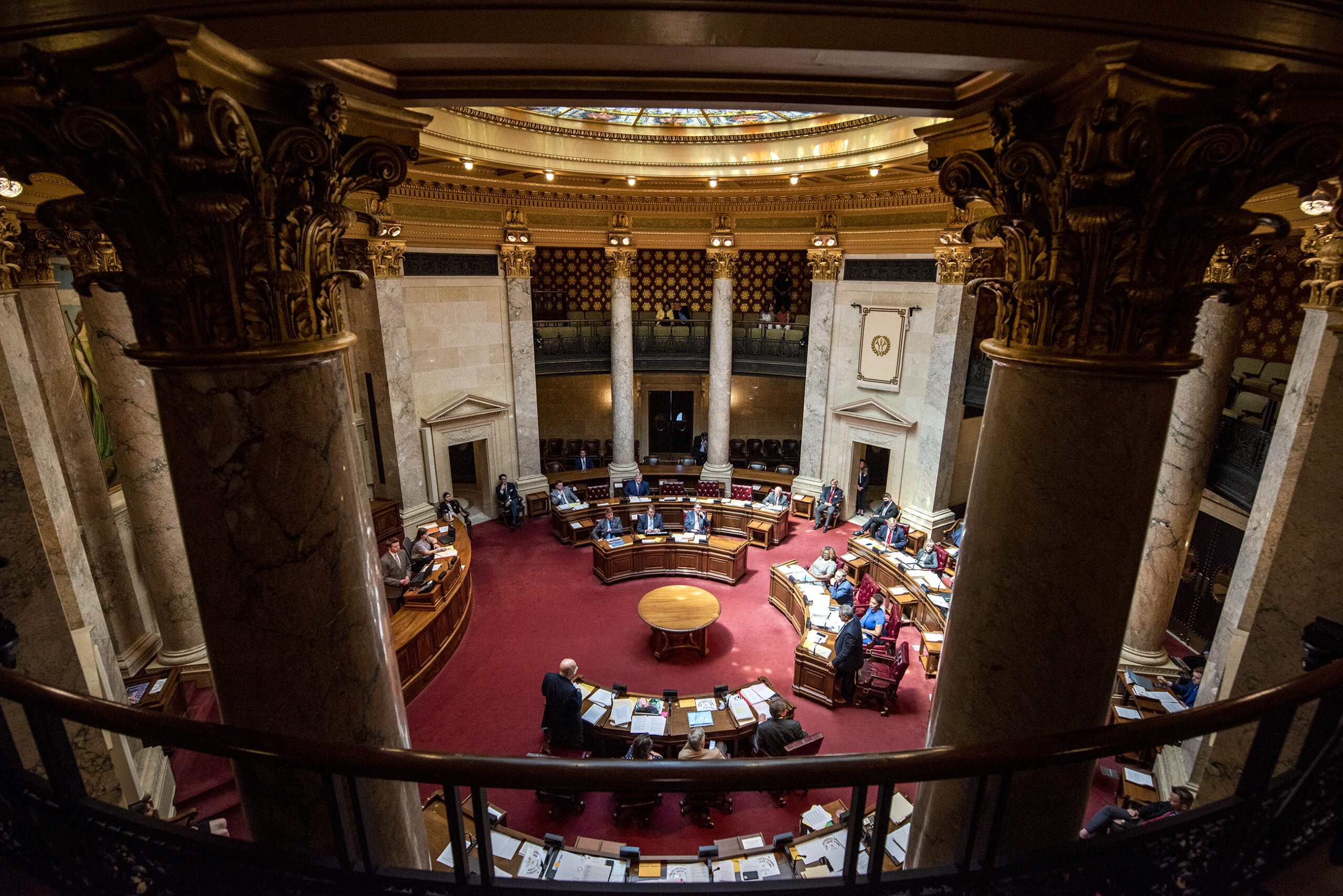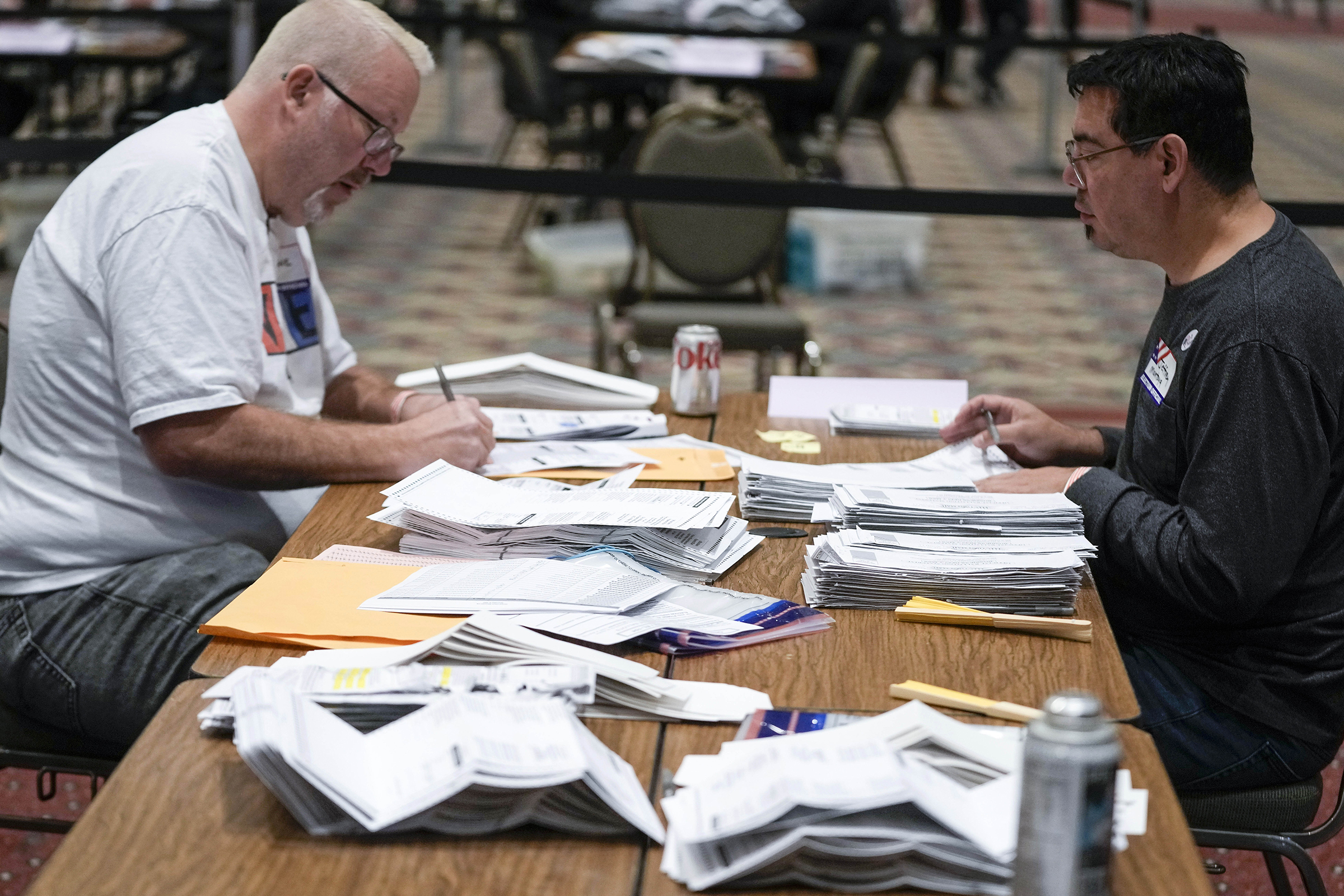The state Senate approved several bills Wednesday that would put new restrictions on absentee voting in Wisconsin, as well as proposals that would change policing in the state, including setting a statewide standard for use of force.
The election bills are part of a Republican package of proposals that largely respond to GOP criticism of the 2020 presidential election.
One measure approved on a voice vote Wednesday would put new restrictions on absentee ballot drop boxes, which were widely used during the last election as clerks navigated a surge in early voting during the COVID-19 pandemic.
News with a little more humanity
WPR’s “Wisconsin Today” newsletter keeps you connected to the state you love without feeling overwhelmed. No paywall. No agenda. No corporate filter.
Under the bill, municipalities could have no more than four drop boxes, depending on their population. The boxes would also have to be located on municipal property, other than public parks, and be tamper- and moisture-resistant. Some boxes would have to be under continuous video surveillance.
During debate, Sen. Alberta Darling, R-River Hills, argued the change would increase ballot security and voter confidence.
“This bill enables the voters to have another option to vote, and it’s in a secure place,” she said. “I think people care about the integrity of elections.”
However, Democrats argued limiting the number of drop boxes would make it more difficult for some voters to cast their ballots.
“The idea that we’re going to have secure drop boxes (is) great, the idea that we are going to make sure that the public, in certain parts of this state and certain parts of cities, can’t get to (the drop boxes) is not great,” said Sen. Jon Erpenbach, D-Middleton. “I mean, why have drop boxes at all?”
Republican senators also voted to approve a bill that would put new requirements in place for voting at nursing homes, including notification requirements for family members of residents about days voting assistants will visit facilities. The bill would also create a felony penalty for nursing home employees who attempt to influence a resident’s voting behavior. The plan passed on a vote of 20-12, with Republicans voting in favor and Democrats against.
Lawmakers also approved a bill that would put new requirements on “indefinitely confined” voters in Wisconsin, a group that grew dramatically in 2020. Under state law, an indefinitely confined voter is defined as someone who is “confined because of age, physical illness or infirmity or is disabled for an indefinite period.”
Under the bill, indefinitely confined voters would have to apply annually to have an absentee ballot sent to them and include a photo ID or signed statement from another United States citizen confirming their identity with their request. The bill also creates a felony penalty for making a false statement about indefinitely confined status, which comes with a fine of up to $10,000 or up to three and a half years in prison.
Sen. Duey Stroebel, R-Saukville, one of the bill’s sponsors, argued during debate that people took advantage of Wisconsin’s laws for indefinitely confined voters during the pandemic.
“It’s important that we accommodate truly indefinitely confined voters, but unfortunately in the last election we saw other people who weren’t truly indefinitely confined, and they were abusing that system,” Stroebel said.
Multiple lawsuits over the 2020 election included arguments about voters who cast ballots under indefinitely confined status. None of those lawsuits were successful.
The plan would also:
- Require all voters to include a copy of their ID with every absentee ballot application, removing the possibility that some voters could have an ID on file at their local clerk’s office.
- Bar election officials from sending an absentee ballot or absentee ballot application to any voter who hasn’t requested one.
- Require more paperwork for absentee voting by mandating that absentee ballot applications must be separate from absentee ballot envelopes. Currently, the envelopes are used as applications.
Democrats argued the proposal would put up too many barriers to voting.
“You have dressed up discriminatory voting practices of the 1960s and gave them a facelift and a new name, called ‘ballot security,’” said Sen. Lena Taylor, D-Milwaukee.
The bill passed 18-14, with Republican Sens. Kathy Bernier, R-Chippewa Falls, and Robert Cowles, R-Green Bay, joining Democrats in voting against it.
Another plan approved Wednesday would bar Wisconsin communities from accepting grant funding to help pay for elections. The bill is a response to GOP pushback on high-dollar grants to Wisconsin’s largest communities in 2020 from the Center for Tech and Civic Life, an organization funded by Facebook CEO Mark Zuckerberg and his wife, Priscilla Chan.
Supporters said the grant money compromised election integrity, while opponents said election officials need all the financial support they can get to administer safe and effective elections. The bill passed 18-14, with Bernier and Cowles again joining Democrats to vote in opposition.
The bill barring the grant funding has already passed the state Assembly. It now moves to Gov. Tony Evers’ desk. The governor hasn’t said whether he will sign it.
None of the other election-related proposals have been taken up in the Assembly. If the measures are approved in both chambers, Evers could veto them. The governor hasn’t weighed in on specific bills, but has said he is opposed to any measure that makes it harder to vote.
Policing Bills Would Change Use Of Force Policies, Penalize ‘Defunding The Police’
Lawmakers also voted along party lines Wednesday to penalize local governments that cut law enforcement budgets to shift resources to other programs in their communities, a move activists sometimes call “defunding the police.”
Under the bill, which passed 20-12, a municipality that decreases its budget for hiring, training and retaining police officers would lose the same amount of money in state support.
Supporters argue the bill promotes public safety, but opponents contend it would discourage communities from attempting new programs aimed at discouraging and addressing crime, like increasing mental health and social support services.
During debate, Sen. Robert Wirch, D-Somers, said state lawmakers shouldn’t involve themselves in municipal budgets.
“I remember when Republicans used to be the ‘small government’ party,” Wirch said. “What are they doing now? Taking power away from city council people to do their budget.”
Another policing bill approved Wednesday was recommended by a bipartisan task force on policing. The task force was created last summer in the wake of widespread unrest following the murder of George Floyd in Minneapolis and severe injury of Jacob Blake in Kenosha at the hands of police officers.
Under the plan, police use of chokeholds would be banned in Wisconsin, except in life-threatening situations or in self-defense. The measure passed on a voice vote.
Another approved bill would create a statewide standard for use of force. Under the standard, “officers are required to make every effort to preserve and protect human life and the safety of all persons.” It says deadly force may be used only as a “last resort when the law enforcement officer reasonably believes that all other options have been exhausted.”
The bill also requires law enforcement who witness what they believe to be an inappropriate use of force incident to report it, and creates whistleblower protections for those reporters. It passed 30-2, with Republican Sens. Steve Nass, R-Whitewater, and Julian Bradley, R-Franklin, voting against.
None of the policing bills have been voted on yet in the Assembly.
Bill Would Increase Penalties On Vaccine Destruction
Senate lawmakers also passed a bill that would make it a felony to intentionally destroy or spoil a vaccine, drug or therapeutic treatment.
Under the bill, a person who is intentionally reckless with a vaccine and renders it unsafe or unusable could be charged with a Class I felony, which comes with a penalty of up to $10,000 or three and a half years in prison.
Last year, a former pharmacist at Aurora Medical Center in Grafton was arrested after admitting to deliberately spoiling more than 500 doses of coronavirus vaccine. This week, the man was sentenced to three years in federal prison and three years of supervised release.
The bill passed on a voice vote. It has yet to be voted on in the Assembly.
Wisconsin Public Radio, © Copyright 2026, Board of Regents of the University of Wisconsin System and Wisconsin Educational Communications Board.







